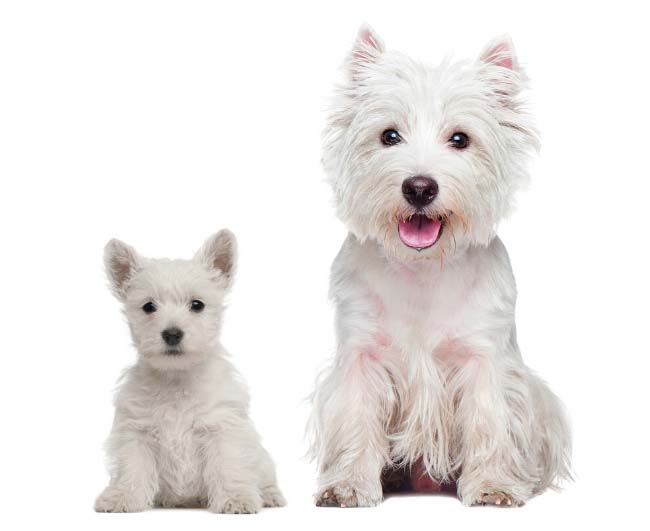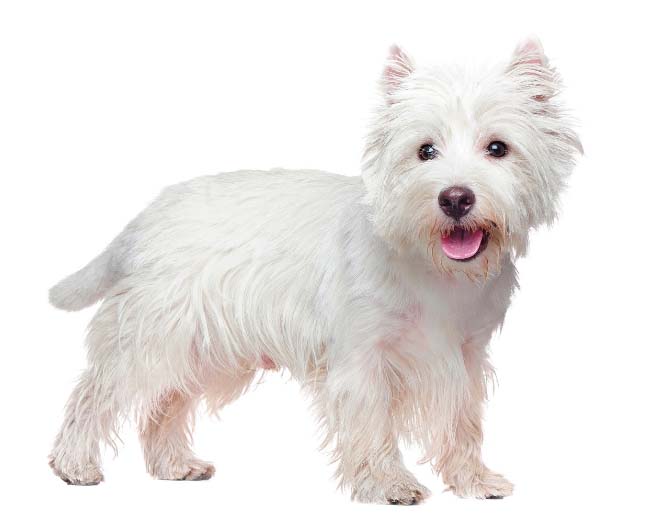We've gone Pink to help fight Breast Cancer.
Use code "BREAST" and we'll Donate $50 to National Breast Cancer Foundation
Main Menu
Petsy Breed Pages
The world’s most comprehensive information on the ...

$1200.00 - $2500.00
Poltalloch Terrier, Roseneath Terrier, White Roseneath Terrier,
Small
Terrier Group
Medium
Extra high
Extra high
12 to 16 years

Would you like to know what it would cost to insure an West Highland White Terrier? Find out by getting a free quote, with petsy pet insurance.








West Highland White Terrier come in a variety of colours, including White, White.


How much do
West Highland White Terrier eat?
0.75 to 1.00 cups of food a day

How much
exercise do they need?
30 to 60 Mins

Are they kid friendly? This breed is a good choice if you have children

Do they need a lot of space? Their compact size can be great for smaller homes, as long as they have access to adequate outdoor space
Patellar Luxation
Legg-Perthes Disease
Hip Dysplasia
Heart murmurs
Westies can be fussy eaters, and adding little treats to their food can help. Treats can be an essential aid in training as well, but giving too many can cause obesity. Their diet should have high protein as well as good sources of fat, vitamins and minerals. Westie pups can benefit from DHA, a specific form of omega-3 fatty acid to aid their brain and eye development.
Check with your vet if you have any concerns about your Westie's weight or diet. They can be prone to developing food allergies and skin problems, consult your vet if you notice any symptoms. Clean, fresh water should be available at all times.
Westies are low to moderate shedders. They are also hypoallergenic dogs, making them ideal for owners with allergies. They have relatively short, dense white coats which can shed dirt quickly. They also have a double coat, consisting of a softer undercoat and a more complex outer coat. Regular brushing will help lessen the amount of hair shedding.
This breed does not need a lot of grooming, but the feathering will need regular combing, brushing with a stiff bristle brush and trimming at least once a week. Their nails should be trimmed at least once or twice a month if your dog doesn't wear them down naturally, this will help to prevent any painful tears and other problems.
Westies generally require less exercise compared to some other, more energetic breeds. 20 to 40 minutes of exercise a day, thorough walks and play sessions will help to keep them happy. Inside the house, Westies are generally calm. Westies love playtime, as well as digging, running and chasing smaller creatures. Because of their natural hunting instincts, it is not recommended to leave your Westie off-leash in any open areas especially near wildlife. Westie's natural terrier ability can be tested through dog sports, including agility, flyball, obedience and rally. Some Westies enjoy swimming but they must be supervised at all times.
Westies are hardy dogs with fewer health-related issues in their lifetime. They may be susceptible to 'Westie jaw', which affects their skull, as well as Legg-Perthes disease and cataracts. Visiting the vet regularly is essential to their overall health and wellbeing. However, the frequency of treatment and checkups will depend on the dog.
Twice a year, health check visits with your vet are essential to ensure your Westie is happy and healthy throughout their life. In these annual visits, your vet will complete a physical examination, take your dog's temperature and check his heartbeat, among other things. Routine maintenance for your dog gives you a chance to track your dog's growth and development and discuss your vet's concerns.
West Highland White Terriers are inquisitive, independent dogs who make excellent family pets and playmates for children of all ages. Despite their physical energy, they have a relatively calm temperament. They can be sensitive and reserved around new people, but they are rarely aggressive. They are also known to get along well with children and other pets in the house.
Westies are independent and can be a bit stubborn, making it challenging to train them. They also possess the instincts to dig holes and bite. Training should start as early as possible, and incorporating various creative and positive reinforcement methods are recommended to help with behaviour correction. They are fast learners when trained early in their life. Their excessive barking may become a concern, so early socialisation with other dogs and animals and proper disciplinary training should be done to prevent this. A Westie may need its training to be refreshed at a later stage in its life.
Westies are generally social with other dogs and are suitable for multi-dog households. However, male Westies may show dislike towards one another. Westies are friendly toward other dogs if they have been properly trained by their owner. Westies can adapt and tolerate cats with enough socialisation; however, you should note that they have a strong prey drive. They will usually chase and sometimes attack smaller animals, including hamsters, guinea pigs and rabbits. Socialising them at a young age is advisable to help with relationship-building.
Here are some of the breeders who we work with as part of our breeder awareness program.
They are invested in ensuring the longevity of the breed and that new owner become responsible Affenpinchers owners.
Affenpinchers who are friends of Petsy





Enter your email in the form below and we will send you the full report as a pdf directly to your inbox.
Don’t worry, we hate spam too – read our privacy policy
Find the right level of insurance for your needs our customised quote takes less than a few minutes to complete.
Westies can be fussy eaters, and adding little treats to their food can help. Treats can be an essential aid in training as well, but giving too many can cause obesity. Their diet should have high protein as well as good sources of fat, vitamins and minerals. Westie pups can benefit from DHA, a specific form of omega-3 fatty acid to aid their brain and eye development.
Check with your vet if you have any concerns about your Westie's weight or diet. They can be prone to developing food allergies and skin problems, consult your vet if you notice any symptoms. Clean, fresh water should be available at all times.
Westies generally require less exercise compared to some other, more energetic breeds. 20 to 40 minutes of exercise a day, thorough walks and play sessions will help to keep them happy. Inside the house, Westies are generally calm. Westies love playtime, as well as digging, running and chasing smaller creatures. Because of their natural hunting instincts, it is not recommended to leave your Westie off-leash in any open areas especially near wildlife. Westie's natural terrier ability can be tested through dog sports, including agility, flyball, obedience and rally. Some Westies enjoy swimming but they must be supervised at all times.
West Highland White Terriers are inquisitive, independent dogs who make excellent family pets and playmates for children of all ages. Despite their physical energy, they have a relatively calm temperament. They can be sensitive and reserved around new people, but they are rarely aggressive. They are also known to get along well with children and other pets in the house.
Westies are generally social with other dogs and are suitable for multi-dog households. However, male Westies may show dislike towards one another. Westies are friendly toward other dogs if they have been properly trained by their owner. Westies can adapt and tolerate cats with enough socialisation; however, you should note that they have a strong prey drive. They will usually chase and sometimes attack smaller animals, including hamsters, guinea pigs and rabbits. Socialising them at a young age is advisable to help with relationship-building.
Suite 58, Mezzanine/388 George St, Sydney NSW 2000
Petsy Pty Ltd (ABN 54 633 343 058, AR 1277359) (‘Petsy’) distributes and promotes Petsy Pet Protection Plus (formally Petsy Pet Insurance), Petsy Puppy Protection Plus and Petsy Kitten Protection Plus as an authorised representative of Knose Financial Services Pty Ltd (ABN 38 620 795 735, AFSL 536651) trading as ThePetInsuranceCompany.com.au (‘ThePetInsuranceCompany.com.au’). ThePetInsuranceCompany.com.au is an underwriting agency acting under a binding authority as an agent for the insurer; Pacific International Insurance Pty Limited (ABN 83 169 311 193) (‘Pacific) in relation to Petsy Puppy Protection Plus and Petsy Kitten Protection Plus policies and Petsy Pet Protection Plus policies from 01 March 2023 or have an anniversary renewal date from 18 March 2023, and the Australia branch of Allied World Assurance Company, Ltd (ABN 54 163 304 907) (‘Allied World’) in relation to Petsy Pet Insurance policies purchased between 17 February 2022 and 28 February 2023 (inclusive) or renewed between 01 March 2023 and 17 March 2023 (inclusive). In all aspects of arranging this product, Petsy and ThePetInsuranceCompany.com.au act as an agent of Pacific/Allied World (as the case may be) and not as your agent. Any advice contained in this email is general advice only and has been prepared without taking into account individual objectives, financial situation or needs and you should consider the appropriateness of any such advice, the Product Disclosure Statement (‘PDS’) and the Target Market Determination (‘TMD’) available via http://www.petsy.com.au or by calling 1300 952 790 before making a decision to acquire, or to continue to hold, the product. Terms, conditions, limits and exclusions apply. Please refer to the PDS.
© Copyright 2024 Petsy Pet Insurance
During the application process You will be provided with the option to include Optional Extra Benefits that cover certain conditions and Treatments which are not otherwise covered under the Policy.
The Optional Extra Benefits are:
Alternative Therapies, Behavioural Problems, and Dental Illness.
Examples of Alternative Therapies: Acupuncture, physiotherapy, hydrotherapy
Examples of Behavioural Problems: Excessive licking, fur pulling, pacing and destructive
chewing.
Examples of Dental Illnesses: Dental diseases, gingivitis, periodontal disease.